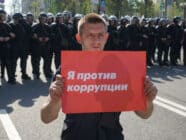A bill aimed at regulating comments online has been described as an attack on freedom of expression in Albania. Under the proposed new law online media administrators who publish, or allow the publication of comments “that affect the honour, personality or reputation of a person” could be charged with a criminal offence.
The MP who introduced the bill, Majlinda Bregu, has referred to a recent test case. In Delfi vs. Estonia, the administrators of Delfi, one of Estonia’s most popular news sites, were convicted for publishing insulting comments about an Estonian citizen. The case was then taken to the European Court of Human Rights which last month upheld the original ruling against Delfi on the basis that while the internet played an important role in upholding freedom of expression, “liability for defamatory or other types of unlawful speech must, in principle, be retained and constitute an effective remedy for violations of personality rights.”
The European Court’s ruling, which it made clear applies to ‘professionally managed portals, run on a commercial basis’ rather than unmoderated online forums and chat sites, has no immediate legal effect, and its long-term implications are not yet clear.
In Albania, civil society and journalists have reacted strongly to political attempts to regulate online comments. Gjergji Erebara, a well-known blogger, described it as a “serious violation of freedom of expression”. Igli Totozani, Albania’s People’s Advocate agreed that if the state blocked information on the internet it would have a detrimental impact on freedom of expression. Another commentator, Theodoros Alexandridhis, representative of Res Publica, a law centre, said it was too soon to know the legal implications of the Delfi v Estonia case.
How should online publishers and journalists deal with comments?
While the political debate surrounding the possible regulation of online comments continues, Albanian journalists and online publishers are asking their own questions about whether to publish all online comments, uncensored, or to introduce some form of self-regulation.
The debate has become more urgent as the number of internet users in Albania grows. While television is still the most popular medium, the internet is rapidly closing the gap, with around two million internet users in 2015.
According to a survey by the Albanian Media Institute, six of the 10 most visited online media in Albania do not apply any kind of moderation to reader comments.
The sites that did not moderate comments gave the following reasons:
Financial: some newsrooms do not have the resources to employ staff to moderate comments.
no written guidelines: most online newsrooms have not yet established any code of ethics or self-regulating rules for their website.
traffic: some online editors actively encourage unmoderated comments from readers, arguing that these can increase the number of visitors to the website.
However, according to Igli Gjelishti, new media commentator and webmaster at Albania’s most visited news website, top-channel.tv, this last argument is invalid. He argues that top-channel.tv did not have a comment section until mid-2014.
Another concern raised by media analysts is that, among the websites that still apply a filter to online comments, there has recently been a notable, and widespread deterioration in standards and quality of moderation.
For example, until 2013 one of the most popular portals in the country, shekulli.com.al, removed of all non-ethical comments, replacing them with the note: “This comment has been deleted for ethical reasons”. But, like many other Albanian sites, this filter is no longer applied on the site.
Some portals are introducing forms of self-regulation as well as ethical standards. News portal, shqiptarja.com, was among the first to draft a code of ethics for its journalists, it also regularly moderates comments. Shqiptarja is proof that filtering and comment moderation does not deter readers: it is among Albania’s fastest growing sites, ranked among the top ten most visited sites within three years of its launch.
Meanwhile the debate continues.
pic credit: Flickr Creative Commons: Anthony Farris
Tags: Albania, Blogging, Censorship, Digital Media, digital news, Freedom of Expression, Journalism, journalists, media, Press freedom, Research, Social media












































